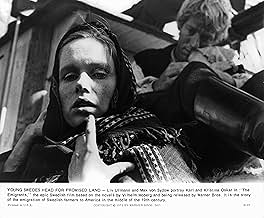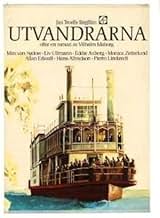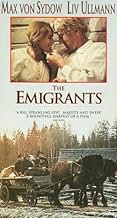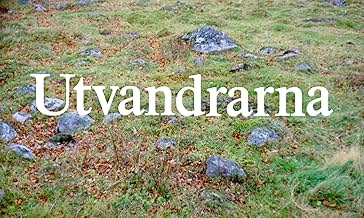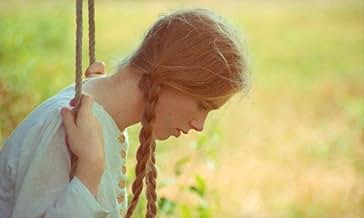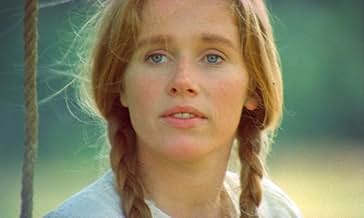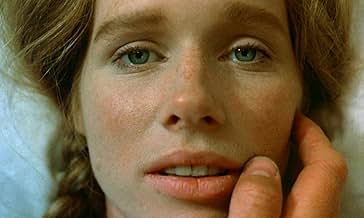An 1840s Swedish farming family struggle with their unyielding land and decide to embark on the arduous journey to new hope in America.An 1840s Swedish farming family struggle with their unyielding land and decide to embark on the arduous journey to new hope in America.An 1840s Swedish farming family struggle with their unyielding land and decide to embark on the arduous journey to new hope in America.
- Director
- Writers
- Stars
- Nominated for 5 Oscars
- 8 wins & 11 nominations total
- Nils
- (as Svenolof Bern)
- Director
- Writers
- All cast & crew
- Production, box office & more at IMDbPro
Featured reviews
The Emigrants alone feels like two, or maybe even three, movies in one. Its runtime exceeds three hours, and it tells the story of a group of farmers in Sweden during the 1800s deciding to start a new life in America. This first half of the overall saga involves establishing how bad life was for a farmer in Sweden, then showing the arduous journey by boat from Sweden to America, and then finally, it spends some time with the characters as they travel further inland after setting foot in America.
It's gruelling by design, and viscerally captures how difficult such a journey would have been back during the middle of the 19th century. The section spent at sea is particularly harrowing, but I guess it has to be, and it doesn't shy away from anything when it comes to claustrophobia, seasickness, lice, terrible food, disease, and death. It makes The Emigrants a tough but compelling watch, and part of me wonders what The New Land will do to keep the stakes high, because it's hard to imagine things getting worse than that trip across the ocean (I may end up eating my words 24-48 hours from now, but we'll have to wait and see).
Not a film for everyone, but I thought it moved pretty well considering its length and slow pace. Performances were generally strong, and it had some very good visuals too. I get the sense Terrence Malick would have loved this movie, too, because I see bits of Badlands, Days of Heaven, The New World, and A Hidden Life in here at times.
The first part of the film details the challenges these people face that make them want to emigrate in the first place. An oppressive village hierarchy in which all laws and rules of accepted behavior are arbitrated by a self-appointed few, as well as conditions that make farming a constant struggle, leave them craving the freedoms and fertility of the mythic U.S. The second part of the film is a meticulous recreation of what the actual journey was like, including a long segment about the miseries of crossing the Atlantic Ocean (including sea sickness and lice), and the interminable trek up the Mississippi River to Minnesota once they landed. It's almost impossible to wrap your head around how frightening this entire experience would have been for them. These people knew almost nothing about the world outside of their small Swedish village (one young man doesn't even know how the ocean works and thinks they're all going to drown if the water rises) and trust themselves to strangers who don't speak their language or really have any reason to look out for their interests. It's a fascinating film and feels more like a documentary than a fictional narrative.
Unfortunately, the only version I was able to see was the dubbed one shown by TCM. I would have much preferred to see it subtitled so that I could experience von Sydow's and Ullmann's performances as they were meant to be experienced.
"The Emigrants" was nominated for Best Foreign Language Film at the 1971 Academy Awards, and then because of Oscar's weird eligibility rules popped up again a year later with four nominations, for Best Picture, Best Director (Jan Troell), Best Actress (Ullmann), and Best Adapted Screenplay. At the time, it was only the third foreign language film after "Grand Illusion" and "Z" to receive a Best Picture nomination. And the film's sequel, "The New Land," was up for Best Foreign Language Film the same year that "The Emigrants" was in the Best Picture race. Good couple of years for director Jan Troell.
Grade: A
There are lots of little touches in the film, such as the family's reaction to being on a train for the first time, reminding us that railroads were a monumental innovation in the 19th century. The priest who is with them along with his followers because they were persecuted in Sweden doles out some sublime thoughts, such as reminding them that even lice are god's creation and that suffering because of them allows one to understand suffering in others better and to empathize. He also dispenses a lot of nonsense, such as the idea that they'll magically understand English when they land in America per his understanding of the Bible, and in general trying to attribute everything that happens in their little lives to divine favor or displeasure operating on them in ways he's always trying to explain after the fact.
The family is incredibly naïve about planning beyond the idea of 'going to America', and their rosy optimism of all the wonderful things they would find there. It's interesting that on the one hand they find a fellow Swede in Minnesota living in what his mother sees as squalor, but on the other hand, that they're free to stake out claims to beautiful, arable land, which is hard to fathom today. They are in some sense disillusioned, but in another sense, are in a paradise of sorts. There are lots of moments where fantasy and reality meet in the film, but it's in nuanced ways and never overplayed.
It's a fantastic moment when we get a brief glimpse of slaves in chains on a steamboat, and in those poor eyes get a heartstopping reminder that to others, coming to America was a very different, horrifying nightmare of an experience. So much for the idea that the young men had read about in Sweden, that "many of the slaves have better houses, food, and circumstances than peasants in Europe." Unfortunately while we might see a few Native Americans at one of the stops, the idea that the land these people from Sweden are claiming had been inhabited by people who were going through genocide is not articulated by the film, though it is in the sequel, 'The New Land.'
In terms of production value, there is a lot to love about the realism. We're not flooded with grand images of landscapes, and even the beauty we see in the woods or fields has a natural ruggedness to it. It's a very small moment, but at one point director Jan Troell gives us the sun on the water during a very serene moment with slow undulations, which I found simply exquisite, and such a contrast to the harshness of the ocean journey. The performances from Max von Sydow, Liv Ullmann, and the rest of the fine cast are unaffected and natural. The version I saw had unfortunately been dubbed in English though, and I think seeing it in Swedish with English subtitles would have been infinitely preferable, and much more in keeping with the spirit of the film, so if it's an option for you, I would certainly seek it out.
I was trying to explain one of the most unique things about the film (and its 2nd part, The New Land) to my brother but I was having a hard time finding the words. Finally, "transfixed" was what I was looking for. The film is long but it held me "transfixed" with nearly every scene. The shots are long. The dialog is often sparse. The soundtrack is almost non-existent. Rather, the director holds one nearly spellbound by "showing" rather "telling" the story. The imagery and expressions on the actors' faces and their silent actions relate most of what makes this film so powerful.
As the viewer, you feel almost like you are right there with the characters, sharing the moments along side them. One becomes immersed in what is happening as if you are there. The powerful empathy that the film manages to generate within the viewer is really quite amazing given the lack (or maybe due to the lack) of modern cinematic styles and techniques.
Another thing about this film that is incredibly impressive is that the viewer really gets a sense of how someone migrating from Sweden at the time would see things and think. The perspective is fresh and unapologetically authentic. Unlike many films set in the past, it does not "dumb-down" any aspect by modernizing or "updating" anything to make it easier for a modern audience to relate to (language, mannerisms, music, etc.). One of my biggest peeves about modern films set in the past is that, other than the wardrobe, everything else is modern... modern language, modern manners, modern politics/norms, modern music (electric guitar in the soundtrack of a "western" film?). It is also refreshingly unpolluted by modern-day political correctness.
This is really a fantastic work of art that in many ways, gets better with time as it is so accurate and truthful to the situation and period. The 2nd part, "The New Land" is equally as fantastic. It is not a "sequel" per se, but rather the filmmaker realized he would need several hours to accurately portray the story set out in the book and one movie would be too long. So, it was essentially shot as one long movie but released in two parts in back-to-back years.
This film really provides the viewer with an authentic sense of the times and the situations many emigrants went through in the mid-19th century. One of the best film discoveries I've made in a long time. Highly recommended.
Few of the characters believe the streets of America are paved with gold. Instead, The Emigrants is a brutally realistic take about struggling and seeing no future in one's homeland and deciding to risk everything in order to have a shot at a better future. The movie is neither cliche nor cynical about the "American Dream." It makes its social points through contrasts and juxtaposition. We see the wealthy Americans aboard a steamboat interspersed with jarring shots of chained slaves below. There also are incredible moments of wonder, like the elderly Swedish woman seeing a steam engine approach for the first time in her life.
The film is an honest and moving portrait about one group of Swedish expats seeking opportunity, whether financial or religious. Perhaps most of all, the movie captures the sense of home and of homelessness for the characters. The chemistry between von Sydow and Ullmann is incredible. Husband and wife, they say they are best friends, and it shows. It's powerful acting.
I would give this film a 9/10, but for the editing. At least a half hour of this film could have been left on the cutting-room floor, particularly in the first half. You could walk away for several minutes and miss nothing. Otherwise, The Emigrants definitely worth seeing.
Did you know
- TriviaWhen filming the scene towards the end, where Karl Oskar walks off to find a better place for his settlement, director Jan Troell forgot to yell, "Cut." Max von Sydow just kept walking and walking, waiting for a "cut", and nobody realized until they took lunch.
- GoofsOn the train west a character shows an American silver coin and yells out it has "In God We Trust" on it. The scene is the 1850s and the motto was not added to American silver coins until 1867.
- Quotes
Arvid: What do you think it will cost to ship us there?
Robert: Around 200 riksdaler.
Arvid: Ya, well, might as well forget it. 200 riksdaler. I'll never have that much.
Robert: You don't have it?
Arvid: I will go anyway. We can travel to America on foot.
Robert: Nah, there's an ocean. You can't go on foot to America.
Arvid: Do you mean there is no way?
Robert: I'm afraid there is not. America is an island.
Arvid: Damned ocean.
- Alternate versionsThe USA television version, retitled "The Emigrant Saga", consists of this film plus its sequel, Le nouveau monde (1972), joined and re-edited together in chronological order and dubbed in English.
- ConnectionsEdited into Spisok korabley (2008)
- How long is The Emigrants?Powered by Alexa
Details
Box office
- Gross US & Canada
- $1,156,554
Contribute to this page


